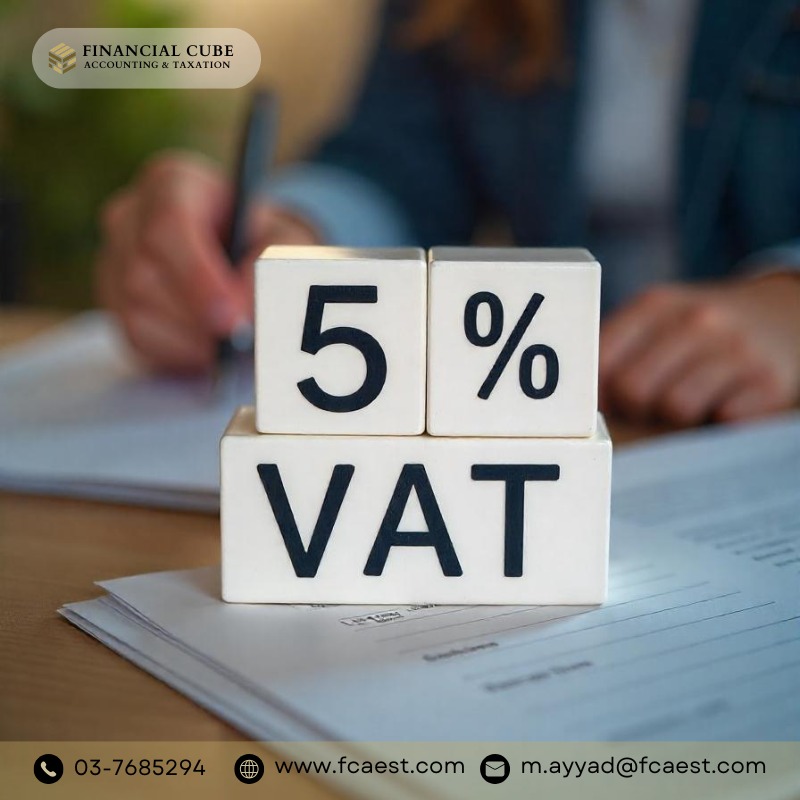- m.ayyad@fcaest.com
VAT Consulting Services in UAE
Financial Cube has a team of dedicated and experienced tax professionals who are continuously trained and updated with current law changes having impact on taxable areas of the clients. Any update by FTA is reviewed and discussed within the team and an analysis is done to identify the impact of the tax law amendments which is then communicated to the clients on timely basis.
VAT compliance is a critical function which needs to be monitored on daily basis and for each type of transaction to ensure accurate recording in the books of accounts and correct reporting to FTA within the due date. Organizations choose to appoint professionally qualified staff to manage VAT-related tasks and ensure compliance of the same.
VAT (Value Added Tax) registration in the UAE is a key compliance requirement for businesses operating in the country. Here’s a detailed overview of the process and requirements for VAT registration:

Understanding VAT in the UAE
- Implementation: VAT was introduced in the UAE on January 1, 2018.
- Rate: The standard VAT rate is 5%, with some goods and services exempt or zero-rated.
VAT Registration Services
You must register for VAT in the UAE if:
- Your taxable supplies and imports exceed AED 375,000 in the past 12 months or are expected to exceed this amount in the next 30 days.
- Your taxable supplies are less than AED 375,000 but exceed AED 187,500, you may register voluntarily.
- You operate a business that provides goods or services subject to VAT.
FINANCIAL CUBE’S ROLE IN YOUR BUSINESS VAT REGISTRATION
- Prepare Required Documents
- Access the Federal Tax Authority (FTA) Portal
- Complete the VAT Registration Form
- Submit Your Application
- Receive VAT Registration Certificate
- Post-Registration Obligations
VAT Return Filing
Filing VAT (Value Added Tax) returns in UAE, is a critical compliance requirement for businesses registered for VAT. Properly managing VAT returns ensures adherence to UAE tax laws, helps avoid penalties, and maintains good standing with the Federal Tax Authority (FTA). VAT Return Filing involves submitting periodic reports to the FTA detailing the VAT you have collected from your customers and the VAT you have paid on your business purchases. The difference between these amounts determines whether you owe VAT to the government or are eligible for a refund.
FINANCIAL CUBE’S ROLE IN YOUR BUSINESS VAT RETURNS
- Gather Necessary Information
- Reconcile Your Accounts
- Access the FTA Portal
- Navigate to VAT Services
- Complete the VAT Return Form
- Review and Validate
- Submit the VAT Return
- Make Payment (If Applicable)
- Post-Filing Obligations
Deregister for UAE VAT
Deregistering for VAT in the UAE is a crucial process that businesses must follow if they are no longer required to be registered under the Federal Tax Authority (FTA) regulations. This could be due to changes in business operations, cessation of taxable supplies, or other factors.
When to Deregister for VAT?
You must deregister for VAT in the UAE if:
- Mandatory Deregistration: Your taxable supplies and imports fall below the VAT registration threshold of AED 187,500 and are not expected to exceed it in the next 30 days.
- Voluntary Deregistration: Your taxable supplies are below the voluntary threshold of AED 375,000 and are not expected to exceed it in the next 30 days.
- Business Closure: You cease making taxable supplies (e.g., closing the business or changing business activities).
Important Note: You must apply for deregistration within 20 business days of meeting the deregistration criteria. Failure to do so may result in fines.
FINANCIAL CUBE’S ROLE IN YOUR BUSINESS VAT DE-REGISTRATION
- Access the FTA
- Navigate to VAT Deregistration
- Complete the Deregistration Form
- Submit the Application
- FTA Review and Approval
